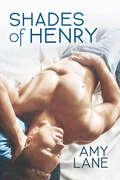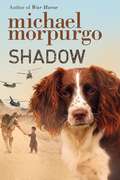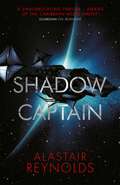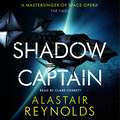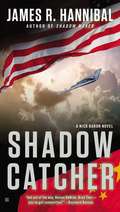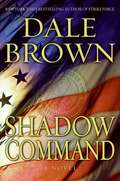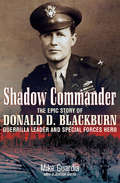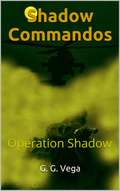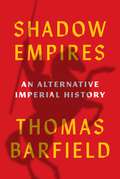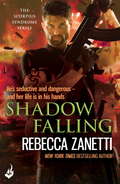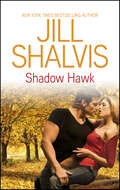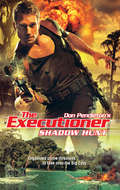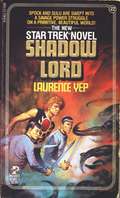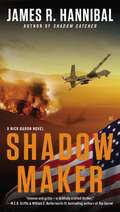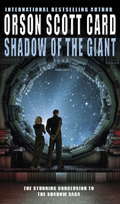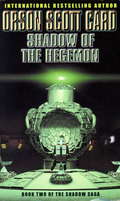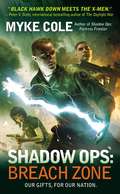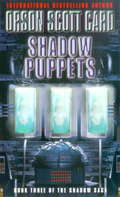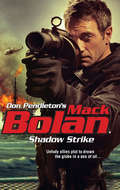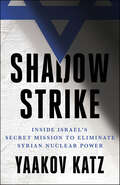- Table View
- List View
Shades of Henry (The Flophouse #1)
by Amy LaneA Flophouse StoryOne bootstrap act of integrity cost Henry Worrall everything—military career, family, and the secret boyfriend who kept Henry trapped for eleven years. Desperate, Henry shows up on his brother’s doorstep and is offered a place to live and a job as a handyman in a flophouse for young porn stars. Lance Luna’s past gave him reasons for being in porn, but as he continues his residency at a local hospital, they now feel more like excuses. He’s got the money to move out of the flophouse and live his own life—but who needs privacy when you’re taking care of a bunch of young men who think working penises make them adults? Lance worries Henry won’t fit in, but Henry’s got a soft spot for lost young men and a way of helping them. Just as Lance and Henry find a rhythm as den mothers, a murder and the ghosts of Henry’s abusive past intrude. Lance knows Henry’s not capable of murder, but is he capable of caring for Lance’s heart?
Shadow
by Michael MorpurgoAuthor of War Horse,and bestselling storyteller Michael Morpurgo touched our hearts with this beautiful story of a boy, his lost dog, and the lengths he would go to be reunited. This timely story of battle-scarred Afghanistan delivers a masterful portrait of war, love, and friendship. With the horrors of war bearing down on them, Aman and his mother are barely surviving in an Afghan cave, and staying there any longer will end horribly. The only comfort Aman has is Shadow, the loyal spaniel that shows up from places unknown, it seems, just when Aman needs him most. Aman, his mother, and Shadow finally leave the destroyed cave in hopes of escaping to England, but are held at a checkpoint, and Shadow runs away after being shot at by the police. Aman and his mother escape--without Shadow. Aman is heart-broken. Just as they are getting settled as free citizens in England, they are imprisoned in a camp with locked doors and a barbed wire fence. Their only hope is Aman's classmate Matt, his grandpa, and the dream of finding his lost dog. After all, you never lose your shadow.
Shadow Agents Collection Volume 1: Alpha One\Guardian Ranger\Sharpshooter\Bulletproof (Shadow Agents)
by Cynthia Eden Carol EricsonFour books in one value edition from New York Times bestselling author Cynthia Eden’s classic Harlequin Intrigue series SHADOW AGENTS. Alpha OneElite Ops covert agent Logan Quinn’s only priority is getting Juliana James out of Mexico alive. His personal mission is to have another chance with the woman he can’t lose again.Guardian RangerDesperate to find her missing brother, sheltered computer programmer Veronica Lane must turn to soldier-turned-elite-ops-agent Jasper Adams—the man she’d been warned to stay far away from. What will happen once Veronica discovers everything about him is a lie…everything except his passion for her?SharpshooterTwo years ago Gunner Ortez saved Sydney Sloan’s life on a mission gone wrong. Ever since then, he’s been watching her back. Now a hostage-rescue mission is about to blow the Elite Ops agents’ lives apart once again. But it’s not just their lives on the line anymore.Bulletproof (originally published in 2013 as Glitter and Gunfire)Former Army Ranger Cale Lane had his orders: keep Cassidy Sherridan alive at all costs. But who sent six armed men storming the Rio ballroom to take her out? The gorgeous party girl wasn’t giving it up. Now he had a more urgent mission: uncover Cassidy’s secrets...one by one.FREE BONUS STORY INCLUDED IN THIS VOLUME!Enjoy LOCKED, LOADED AND SEALED by Carol Ericson from her RED, WHITE AND BUILT series!The SEAL’s secret assignment had been to protect a certain important doctor. But when the man is murdered, Austin Foley’s mission changes. The navy sniper must now protect the doctor’s protégé the irresistible Sophia Grant, at any cost. There’s only one problem: Sophia has no idea what those secrets she holds.
Shadow Captain (Revenger #2)
by Alastair Reynolds'A swashbuckling thriller - Pirates of the Caribbean meets Firefly - that nevertheless combines the author's trademark hard SF with effective, coming-of-age characterisation' GUARDIAN'A blindingly clever imagining of our solar system in the far flung future' SUNReturning to the universe of Revenger, award-winning author Alastair Reynolds delivers another thrilling tale set among the stars.Two sisters ran away from home to join the crew of a spaceship. They took on pirates, faced down monsters and survived massacres . . . and now they're in charge. Captaining a fearsome ship of their own, adventures are theirs for the taking - and there's hoards to loot and treasures to find in the darkest reaches of space. But the rules are also more relaxed out on the fringes, as they're about to discover . . .'A rollicking adventure yarn with action, abduction, fights, properly scary hazards, very grisly torture and even ghosts of a sort' DAILY TELEGRAPH'By far the most enjoyable book Reynolds has ever written' SFX
Shadow Captain (Revenger)
by Alastair Reynolds'A swashbuckling thriller - Pirates of the Caribbean meets Firefly - that nevertheless combines the author's trademark hard SF with effective, coming-of-age characterisation' GUARDIAN'A blindingly clever imagining of our solar system in the far flung future' SUNReturning to the universe of Revenger, award-winning author Alastair Reynolds delivers another thrilling tale set among the stars.Two sisters ran away from home to join the crew of a spaceship. They took on pirates, faced down monsters and survived massacres . . . and now they're in charge. Captaining a fearsome ship of their own, adventures are theirs for the taking - and there's hoards to loot and treasures to find in the darkest reaches of space. But the rules are also more relaxed out on the fringes, as they're about to discover . . .'A rollicking adventure yarn with action, abduction, fights, properly scary hazards, very grisly torture and even ghosts of a sort' DAILY TELEGRAPH'By far the most enjoyable book Reynolds has ever written' SFX
Shadow Catcher
by James R. HannibalFrom James R. Hannibal--a veteran combat pilot with Top Secret clearance from the U.S. government--comes an electrifying high-tech thriller in the great tradition of Tom Clancy... Over ten years ago, Air Force major Nick Baron was part of a failed special ops mission that left a B-2 stealth bomber at the bottom of the Persian Gulf. Now, leading his men--the Triple Seven Chase team--Baron must find the bomber and dispose of it for good before any unfriendly nation can steal the onboard technology for its own purposes. But as the team embarks on its mission, there are greater dangers waiting. When the CIA intercepts a call signal from an operative in China long thought dead, the Triple Seven Chase team is given the perilous task of retrieving the lone soldier from deep within the Chinese wilderness. There is only one plane for such a dangerous mission: the Shadow Catcher, a plane with capabilities beyond anything that has ever flown. What Baron and his men don't know is that the enemy is already among them--and that the Shadow Catcher itself may be the ultimate prize.
Shadow Command (Patrick McLanahan Series #14)
by Dale BrownAmerica's most advanced military unit rebels against the very government it's charged to protect in this pulse-pounding military thriller chock-full of suspense, adventure, and high-tech weaponry. General Patrick McLanahan's new Aerospace Battle Force has grown into a full-fledged task force based on the Armstrong Space Station. Providing almost instant access to space and every corner of the globe using the Black Stallion space-planes, the ABF's powerful network of satellites and unmanned aircraft controlled from space can not only attack any target anywhere on the planet within hours but can even invade any computer network as easily as making a phone call. But the program has its critics and doomsayers, including Russia, the United Nations, and the American press. Wealthy, Western-educated, and sophisticated Russian president Leonid Zevitin uses a combination of top-secret anti-spacecraft weaponry, fearmongering, and new U.S. president Joseph Gardner's own egotism in an effective plan to eliminate all support for the space program. Gardner and his allies in Congress and the Pentagon will stop at nothing-even destroying one of their own-to get what they want. Yet McLanahan and his forces refuse to allow the Russian aggression to stand. McLanahan ignores directives from the White House and Pentagon to stand down and orders the ABF to attack secret Russian bases in Iran. President Gardner orders McLanahan's immediate arrest. But before authorities can throw him in jail, they have to figure out how to retrieve him from the space base orbiting the earth. Currently in control of the Aerospace Battle Force from Armstrong Space Station, McLanahan closely watches Russia's movement of weaponry while defending himself against the President's attempts to discredit him. In a race against time, McLanahan must outmaneuver his own countrymen, defeat the Russians, and expose the truth ... or die trying.
Shadow Commander: The Epic Story of Donald D. Blackburn—Guerrilla Leader and Special Forces Hero
by Mike GuardiaThe fires on Bataan burned on the evening of April 9, 1942--illuminating the white flags of surrender against the nighttime sky. Woefully outnumbered, outgunned, and ill-equipped, battered remnants of the American-Philippine army surrendered to the forces of the Rising Sun. Yet amongst the chaos and devastation of the American defeat, US Army Captain Donald D. Blackburn refused to lay down his arms. With future Army Special Forces legend Russell Volckmann, Blackburn escaped from Bataan and fled to the mountainous jungles of North Luzon, where they raised a private army of more than 22,000 men against the Japanese. Once there, Blackburn organized a guerrilla regiment from among the native tribes in the Cagayan Valley. "Blackburn's Headhunters," as they came to be known, devastated the Japanese 14th Army within the western provinces of North Luzon and destroyed the Japanese naval base at Aparri--the largest enemy anchorage in the Philippines. After the war, Blackburn remained on active duty and played a key role in initiating Army Special Forces operations in Southeast Asia. In 1958, as commander of the 77th Special Forces Group, he spearheaded Operation White Star in Laos--the first major deployment of Army Special Forces to a country with an active insurgency. Seven years later, Blackburn took command of the highly classified Studies and Observations Group (SOG), charged with performing secret missions now that main-force Communist incursions were on the rise. In the wake of the CIA's disastrous Leaping Lena program, in 1964 Blackburn revitalized the Special Operations campaign in South Vietnam. Sending cross-border reconnaissance teams into Cambodia and North Vietnam, he discovered the clandestine networks and supply nodes of the infamous Ho Chi Minh Trail. Taking this information directly to General Westmoreland, Blackburn received authorization to conduct full-scale operations against the NVA and Viet Cong operating in Laos and Cambodia. In combats large and small, the Communists realized they had met a master of insurgent tactics--and he was on the US side. Following his return to the United States, Blackburn was appointed "Special Assistant for Counterinsurgency and Special Activities," where he was the architect of the infamous Son Tay Prison Raid. Officially termed Operation Ivory Coast, the Son Tay raid was the largest prisoner-of-war rescue mission--and indeed, the largest Army Special Forces operation--of the Vietnam War. During a period when United States troops in Southeast Asia faced guerrilla armies on every side, it has been little recognized today that America had a superb covert commander of its own, his guerrilla skills honed in resistance against Japan. This book follows Donald D. Blackburn through both his youthful days of desperate combat against an Empire, and through his days as a commander, imparting his lessons to the newly realized ranks of America's own Army Special Forces.
Shadow Commandos: Operation Shadows
by G. G. Vega P. SepulvedaIn 2016 a strange event took place in Bolivia during the administration of Enso Morales. A foreign private company, engaging in the sale of military equipment from highly-developed nations, focused on the development of a military tour de force demonstration, specifically promoting the features and capacities of Apache type helicopters, with advanced technological systems. Four Apache type helicopters covered regions of Bolivia, accompanied by a group of men who had been prepared for special operations in highly-developed nations. They did not officially represent any government, but they were clearly men of war; specialists, and probably professional mercenaries. For this reason, the military intelligence was urgently required to investigate the issue to ensure Paraguay's national security. The reports led to a series of security and military measures carried out by the nation's special forces. In 2016 a strange event took place in Bolivia during the administration of Enso Morales. A foreign private company, engaging in the sale of military equipment from highly-developed nations, focused on the development of a military tour de force demonstration, specifically promoting the features and capacities of Apache type helicopters, with advanced technological systems. Four Apache type helicopters covered regions of Bolivia, accompanied by a group of men who had been prepared for special operations in highly-developed nations. They did not officially represent any government, but they were clearly men of war; specialists, and probably professional mercenaries. For this reason, the military intelligence was urgently required to investigate the issue to ensure Paraguay's national security. The reports led to a series of security and military measures carried out by the nation's special forces.
Shadow Divers
by Robert KursonIn the tradition of Jon Krakauer's Into Thin Air and Sebastian Junger's The Perfect Storm comes a true tale of riveting adventure in which two weekend scuba divers risk everything to solve a great historical mystery-and make history themselves.For John Chatterton and Richie Kohler, deep wreck diving was more than a sport. Testing themselves against treacherous currents, braving depths that induced hallucinatory effects, navigating through wreckage as perilous as a minefield, they pushed themselves to their limits and beyond, brushing against death more than once in the rusting hulks of sunken ships.But in the fall of 1991, not even these courageous divers were prepared for what they found 230 feet below the surface, in the frigid Atlantic waters sixty miles off the coast of New Jersey: a World War II German U-boat, its ruined interior a macabre wasteland of twisted metal, tangled wires, and human bones-all buried under decades of accumulated sediment.No identifying marks were visible on the submarine or the few artifacts brought to the surface. No historian, expert, or government had a clue as to which U-boat the men had found. In fact, the official records all agreed that there simply could not be a sunken U-boat and crew at that location.Over the next six years, an elite team of divers embarked on a quest to solve the mystery. Some of them would not live to see its end. Chatterton and Kohler, at first bitter rivals, would be drawn into a friendship that deepened to an almost mystical sense of brotherhood with each other and with the drowned U-boat sailors-former enemies of their country. As the men's marriages frayed under the pressure of a shared obsession, their dives grew more daring, and each realized that he was hunting more than the identities of a lost U-boat and its nameless crew.Author Robert Kurson's account of this quest is at once thrilling and emotionally complex, and it is written with a vivid sense of what divers actually experience when they meet the dangers of the ocean's underworld. The story of Shadow Divers often seems too amazing to be true, but it all happened, two hundred thirty feet down, in the deep blue sea.
Shadow Divers
by Robert KursonIn the tradition of Jon Krakauer's Into Thin Air and Sebastian Junger's The Perfect Storm comes a true tale of riveting adventure in which two weekend scuba divers risk everything to solve a great historical mystery-and make history themselves.For John Chatterton and Richie Kohler, deep wreck diving was more than a sport. Testing themselves against treacherous currents, braving depths that induced hallucinatory effects, navigating through wreckage as perilous as a minefield, they pushed themselves to their limits and beyond, brushing against death more than once in the rusting hulks of sunken ships.But in the fall of 1991, not even these courageous divers were prepared for what they found 230 feet below the surface, in the frigid Atlantic waters sixty miles off the coast of New Jersey: a World War II German U-boat, its ruined interior a macabre wasteland of twisted metal, tangled wires, and human bones-all buried under decades of accumulated sediment.No identifying marks were visible on the submarine or the few artifacts brought to the surface. No historian, expert, or government had a clue as to which U-boat the men had found. In fact, the official records all agreed that there simply could not be a sunken U-boat and crew at that location.Over the next six years, an elite team of divers embarked on a quest to solve the mystery. Some of them would not live to see its end. Chatterton and Kohler, at first bitter rivals, would be drawn into a friendship that deepened to an almost mystical sense of brotherhood with each other and with the drowned U-boat sailors-former enemies of their country. As the men's marriages frayed under the pressure of a shared obsession, their dives grew more daring, and each realized that he was hunting more than the identities of a lost U-boat and its nameless crew.Author Robert Kurson's account of this quest is at once thrilling and emotionally complex, and it is written with a vivid sense of what divers actually experience when they meet the dangers of the ocean's underworld. The story of Shadow Divers often seems too amazing to be true, but it all happened, two hundred thirty feet down, in the deep blue sea.
Shadow Divers: The True Adventure of Two Americans Who Risked Everything to Solve One of the Last Mysteries of World War II
by Robert KursonIn the tradition of Jon Krakauer’s Into Thin Air and Sebastian Junger’s The Perfect Storm comes a true tale of riveting adventure in which two weekend scuba divers risk everything to solve a great historical mystery–and make history themselves.<P> For John Chatterton and Richie Kohler, deep wreck diving was more than a sport. Testing themselves against treacherous currents, braving depths that induced hallucinatory effects, navigating through wreckage as perilous as a minefield, they pushed themselves to their limits and beyond, brushing against death more than once in the rusting hulks of sunken ships. But in the fall of 1991, not even these courageous divers were prepared for what they found 230 feet below the surface, in the frigid Atlantic waters sixty miles off the coast of New Jersey: a World War II German U-boat, its ruined interior a macabre wasteland of twisted metal, tangled wires, and human bones–all buried under decades of accumulated sediment. No identifying marks were visible on the submarine or the few artifacts brought to the surface. No historian, expert, or government had a clue as to which U-boat the men had found. In fact, the official records all agreed that there simply could not be a sunken U-boat and crew at that location.<P> Over the next six years, an elite team of divers embarked on a quest to solve the mystery. Some of them would not live to see its end. Chatterton and Kohler, at first bitter rivals, would be drawn into a friendship that deepened to an almost mystical sense of brotherhood with each other and with the drowned U-boat sailors–former enemies of their country. As the men’s marriages frayed under the pressure of a shared obsession, their dives grew more daring, and each realized that he was hunting more than the identities of a lost U-boat and its nameless crew.<P> Author Robert Kurson’s account of this quest is at once thrilling and emotionally complex, and it is written with a vivid sense of what divers actually experience when they meet the dangers of the ocean’s underworld. The story of Shadow Divers often seems too amazing to be true, but it all happened, two hundred thirty feet down, in the deep blue sea.
Shadow Empires: An Alternative Imperial History
by Thomas J. BarfieldAn original study of empire creation and its consequences, from ancient through early modern timesThe world’s first great empires established by the ancient Persians, Chinese, and Romans are well known, but not the empires that emerged on their margins in response to them over the course of 2,500 years. These counterempires or shadow empires, which changed the course of history, include the imperial nomad confederacies that arose in Mongolia and extorted resources from China rather than attempting to conquer it, as well as maritime empires such as ancient Athens that controlled trade without seeking territorial hegemony. In Shadow Empires, Thomas Barfield identifies seven kinds of counterempire and explores their rise, politics, economics, and longevity.What all these counterempires had in common was their interactions with existing empires that created the conditions for their development. When highly successful, these counterempires left the shadows to become the world’s largest empires—for example, those of the medieval Muslim Arabs and of the Mongol heirs of Chinggis Khan. Three former shadow empires—Manchu Qing China, Tsarist Russia, and British India—made this transformation in the late eighteenth century and came to rule most of Eurasia. However, the DNA of their origins endured in their unique ruling strategies. Indeed, world powers still use these strategies today, long after their roots in shadow empires have been forgotten.Looking afresh at the histories of important types of empires that are often ignored, Shadow Empires provides an original account of empire formation from the ancient world to the early modern period.
Shadow Falling: A gripping thriller of dangerous race for survivial against a deadly bacteria... (The Scorpius Syndrome #2)
by Rebecca Zanetti'This dark, post-apocalyptic tale is a testament to the power of hope and love against all odds' Romantic TimesIt's a dangerous race for survival in the aftermath of a deadly bacteria spreading across the globe. And danger has never looked quite so delicious...Before the Scorpius Syndrome tore through North America and nearly wiped out the population, Vivienne Kennedy was the FBI's best profiler. The bacteria got her anyway. But she survived. She recovered. And when she woke up from a drug-nightmare of captivity, her skills as a hunter of men had gone from merely brilliant to full-on uncanny. Her mysterious rescuer wants her to put them to the test. But no matter how tempting he is, with his angel's eyes and devil's tongue, Vinnie knows she shouldn't trust him.'Thrilling post-apocalyptic romance at its dark, sizzling best!' Lara AdrianFor more thrilling passion played out against the dangerous race for survival, look for all the titles in The Scorpius Syndrome series:Mercury StrikingShadow FallingJustice AscendingStorm GatheringWinter IgnitingKnight Awakening
Shadow Hawk
by Jill ShalvisThe deadliest combo is a killer body-with a lover's touch!When his latest mission turns into a bloodbath, ATF officer JT Hawk realizes he's been set up by someone at the top. Wounded and on the run, he has no choice but to take beautiful Abby Wells hostage. After all, she's in danger, too. And if the only way to keep the fiercely independent communications expert safe is to cuff her and bring her along for the ride, he'll do it. With pleasure, even.Only, given their close contact, it's not long before Hawk's thinking about a totally different kind of pleasure....
Shadow Hunt
by Don PendletonAfter a U.S. Marshal goes missing in New Orleans, Mack Bolan sets out on a search-and-rescue mission and is thrown into an intricate web of corruption. It seems the Mafia is alive and well in the Big Easy and operating under the rule of a powerful new leader.
Shadow Lord (Star Trek: The Original Series #22)
by Laurence YepAngira is a primitive, violent planet -- and young Prince Vikram returns from Earth filled with new ideas. When Sulu and Spock accompany Vikram home, they walk into a bloodbath: reactionary forces, afraid of any modernization, have seized Vikram's rightful throne. Suddenly the men from the Enterprise are on an underground journey with a Prince who is coming of age. The future of Angira is at stake, and each man's survival depends on his skill -- and daring -- with a sword!
Shadow Maker
by James R. HannibalHow far will collateral damage from a CIA drone strike reach? When a suicide bomber shatters the peace of a winter afternoon on the National Mall in Washington, D.C., former pilot and undercover Cerberus operative Nick Baron receives an eerie invitation from the chess app on his phone--a mysterious figure named The Emissary wants to play. Nick and his covert unit--the Triple Seven Chase team--soon find themselves drawn into battle against an unknown opponent who has resurrected an ancient order of assassins: the legendary Hashashin. And there is a long-awaited prophecy being fulfilled by a series of violent attacks which may culminate in a final apocalypse over Jerusalem. As the Triple Seven fight to stop each attack, Nick tries to keep The Emissary on the hook by playing their digital chess game. The lines between the game and the fight begin to blur, as every time Nick loses a piece on the board, he loses one of his men. And if Nick cannot find a way to stop the terrorist mastermind, a checkmate may kill millions...
Shadow Of The Giant: Book 4 of the Shadow Saga (Shadow Saga #4)
by Orson Scott CardThe work of a confident master with an absolute grip on his material - SFX'Card has taken the venerable SF concepts of a superhuman and interstellar war ... and, with superb characterisation, pacing and language, combined them into a seamless story of compelling power.' - BooklistBean was the smallest student at the Battle School, but he became Ender Wiggins' right hand, since then he has grown to be a power on Earth. He served the Hegemon as strategist and general in the terrible wars that followed Ender's defeat of the alien empire attacking Earth. Now he and his wife Petra yearn for a safe place to build a family - something he has never known - but there is nowhere on Earth that does not harbor his enemies - old enemies from the days in Ender's Jeesh, new enemies from the wars on Earth. To find security, Bean and Petra must once again follow in Ender's footsteps. They must leave Earth behind, in the control of the Hegemon, and look to the stars.The fourth book in Orson Scott Card's brilliant Shadow Saga.Books by Orson Scott Card:Alvin Maker novelsSeventh SonRed ProphetPrentice AlvinAlvin JourneymanHeartfireThe Crystal CityEnder Wiggin SagaEnder's GameSpeaker for the DeadXenocideChildren of the MindEnder in ExileHomecomingThe Memory of the EarthThe Call of the EarthThe Ships of the EarthEarthfallEarthbornFirst Formic War (with Aaron Johnston)Earth UnawareEarth AfireEarth Awakens
Shadow Of The Hegemon: Book 2 of The Shadow Saga (Shadow Saga #2)
by Orson Scott Card'The characterizations are first class, and the fast-paced action features one hair-raising episode after another....Shadow of the Hegemon is so nicely integrated into the rest of the Ender canon that readers will be completely enthralled.' - Booklist'Shadow of the Hegemon is an ideal book with which to start your science fiction year.' - Rocky Mountain NewsOrson Scott Card's award-winning Ender series is a genuine classic of science fiction. With ENDER'S SHADOW, the first book in the Shadow Saga, he took the series into fascinating new territory. For Ender Wiggin was not the only young recruit to be trained at Battle School.Ender Wiggin and his fellow pupils at Battle School have defeated the alien forces in an extraordinary military operation. Ender's destiny among the stars awaits him, but for his young army it is time to return to earth. One by one, however, they are disappearing. Earth faces a new danger, only this time the enemy is much closer to home.The second book in the new Ender series by bestselling author Orson Scott Card.Books by Orson Scott Card:Alvin Maker novelsSeventh SonRed ProphetPrentice AlvinAlvin JourneymanHeartfireThe Crystal CityEnder Wiggin SagaEnder's GameSpeaker for the DeadXenocideChildren of the MindEnder in ExileHomecomingThe Memory of the EarthThe Call of the EarthThe Ships of the EarthEarthfallEarthbornFirst Formic War (with Aaron Johnston)Earth UnawareEarth AfireEarth Awakens
Shadow Ops: Breach Zone
by Myke ColeThe Great Reawakening did not come quietly. Across the country and in every nation, people began "coming up Latent," developing terrifying powers--summoning storms, raising the dead, and setting everything they touch ablaze. Those who Manifest must choose: become a sheepdog who protects the flock or a wolf who devours it... In the wake of a bloody battle at Forward Operating Base Frontier and a scandalous presidential impeachment, Lieutenant Colonel Jan Thorsson, call sign "Harlequin," becomes a national hero and a pariah to the military that is the only family he's ever known. In the fight for Latent equality, Oscar Britton is positioned to lead a rebellion in exile, but a powerful rival beats him to the punch: Scylla, a walking weapon who will stop at nothing to end the human-sanctioned apartheid against her kind. When Scylla's inhuman forces invade New York City, the Supernatural Operations Corps are the only soldiers equipped to prevent a massacre. In order to redeem himself with the military, Harlequin will be forced to face off with this havoc-wreaking woman from his past, warped by her power into something evil...
Shadow Puppets: Book 3 of the Shadow Saga (Shadow Saga #3)
by Orson Scott Card'Certain to be one of the most sought-after books of the year' - The Times'Full of surprises ... Intense is the word for Orson Scott Card's ENDER'S GAME' - LOCUSManoeuvring through international politics and war, Peter Wiggin and Achilles are each determined to defeat the other and become Hegemon. When cloned embryos carrying Bean's brilliant intelligence fall into the hands of Achilles' people, the race to protect the world has only just begun...Orson Scott Card's award-winning Ender series is a genuine classic of science fiction. In SHADOW PUPPETS, the third book in the new series following ENDER'S SHADOW and SHADOW OF THE HEGEMON, he follows the fates of Ender's fellow pupils from Battle School - now facing terrible new challenges, both personal and political.Books by Orson Scott Card:Alvin Maker novelsSeventh SonRed ProphetPrentice AlvinAlvin JourneymanHeartfireThe Crystal CityEnder Wiggin SagaEnder's GameSpeaker for the DeadXenocideChildren of the MindEnder in ExileHomecomingThe Memory of the EarthThe Call of the EarthThe Ships of the EarthEarthfallEarthbornFirst Formic War (with Aaron Johnston)Earth UnawareEarth AfireEarth Awakens
Shadow Puppets: Book 3 of the Shadow Saga (The\shadow Ser. #3)
by Orson Scott Card'Certain to be one of the most sought-after books of the year' - The Times'Full of surprises ... Intense is the word for Orson Scott Card's ENDER'S GAME' - LOCUSManoeuvring through international politics and war, Peter Wiggin and Achilles are each determined to defeat the other and become Hegemon. When cloned embryos carrying Bean's brilliant intelligence fall into the hands of Achilles' people, the race to protect the world has only just begun...Orson Scott Card's award-winning Ender series is a genuine classic of science fiction. In SHADOW PUPPETS, the third book in the new series following ENDER'S SHADOW and SHADOW OF THE HEGEMON, he follows the fates of Ender's fellow pupils from Battle School - now facing terrible new challenges, both personal and political.Books by Orson Scott Card:Alvin Maker novelsSeventh SonRed ProphetPrentice AlvinAlvin JourneymanHeartfireThe Crystal CityEnder Wiggin SagaEnder's GameSpeaker for the DeadXenocideChildren of the MindEnder in ExileHomecomingThe Memory of the EarthThe Call of the EarthThe Ships of the EarthEarthfallEarthbornFirst Formic War (with Aaron Johnston)Earth UnawareEarth AfireEarth Awakens
Shadow Strike
by Don PendletonEco-Armageddon is the goal of a far-reaching plan with the scope, vision and power to strike oil rigs around the globe. With unprecedented disaster looming, Mack Bolan begins the hunt to identify and stop the terror dealers behind the threat. A trail that starts in Brooklyn's underworld leads to black market underwater mines, the looting and sinking of a British destroyer carrying gold, and the purchase of Hercules transports in Miami. The long arm of the terrorist operation, brilliantly organized by a vengeance-hungry madman, is soon to be hijacked by the Russian mob. Adding rocket torpedoes to the punishing arsenal, the enemy is all but invincible, possessing the technology, the soldiers and the greed to kill millions and doom the world.
Shadow Strike: Inside Israel's Secret Mission to Eliminate Syrian Nuclear Power
by Yaakov KatzA 2019 National Jewish Book Award Finalist"At the top of my reading list." —Alan Dershowitz, professor emeritus at Harvard Law School"Reads like an international thriller, but it is actually a compelling factual day-by-day (and sometimes hour-by-hour) account of an incident of acute threat and decisive action by the Jewish state...". —Jonathan Kirsch, Jewish Journal ReviewThe never-before-told inside story of how Israel stopped Syria from becoming a global nuclear nightmare—and its far-reaching implicationsOn September 6, 2007, shortly after midnight, Israeli fighters advanced on Deir ez-Zour in Syria. Israel often flew into Syria as a warning to President Bashar al-Assad. But this time, there was no warning and no explanation. This was a covert operation, with one goal: to destroy a nuclear reactor being built by North Korea under a tight veil of secrecy in the Syrian desert.Shadow Strike tells, for the first time, the story of the espionage, political courage, military might and psychological warfare behind Israel’s daring operation to stop one of the greatest known acts of nuclear proliferation. It also brings Israel’s powerful military and diplomatic alliance with the United States to life, revealing the debates President Bush had with Vice President Cheney and Israeli Prime Minister Ehud Olmert as well as the diplomatic and military planning that took place in the Oval Office, the Prime Minister’s Office in Jerusalem, and inside the IDF’s underground war room beneath Tel Aviv. These two countries remain united in a battle to prevent nuclear proliferation, to defeat Islamic terror, and to curtail Iran’s attempts to spread its hegemony throughout the Middle East. Yaakov Katz's Shadow Strike explores how this operation continues to impact the world we live in today and if what happened in 2007 is a sign of what Israel will need to do one day to stop Iran's nuclear program. It also asks: had Israel not carried out this mission, what would the Middle East look like today?
